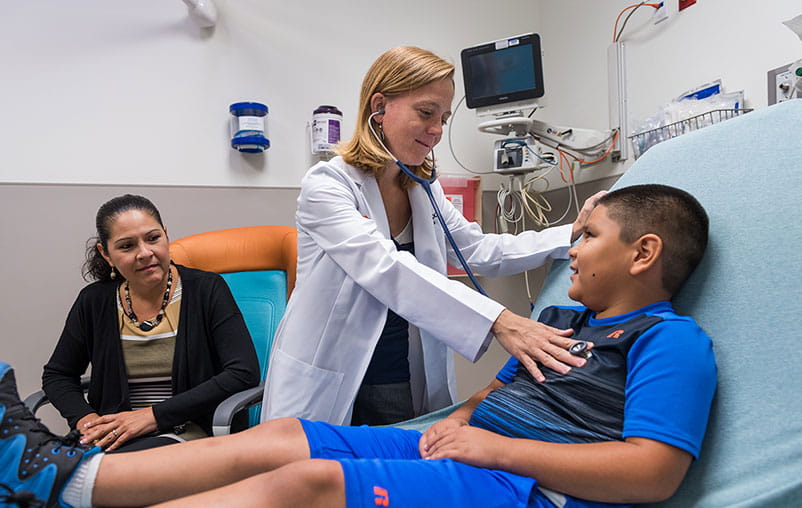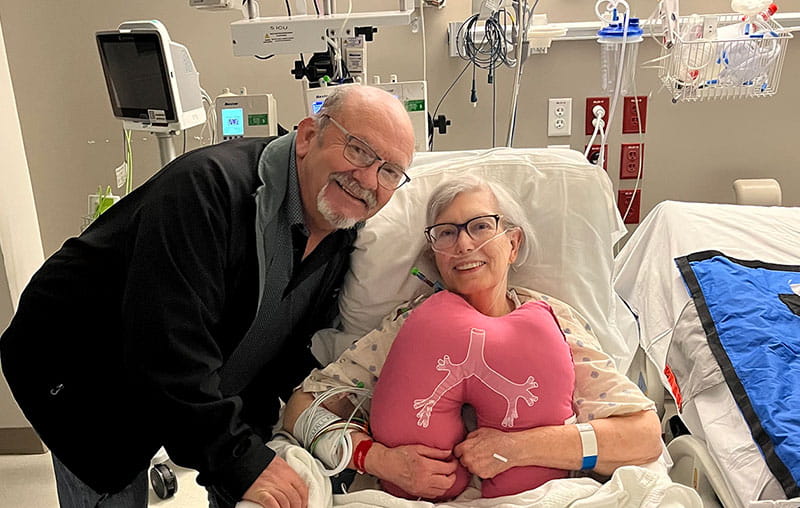Six weeks after she was born, Alma Arellano of Brownsville was diagnosed with biliary atresia, a serious liver disorder in which the bile ducts aren’t working properly. Within days, she underwent surgery at University Hospital to restore the flow of bile from her liver.
While the ducts were repaired, Alma developed a series of infections that eventually caused her liver to fail. And because of her tiny size, it proved difficult to find a size-matched deceased donor liver to transplant into her.
“She was literally slipping away from us,” said Dr. Francisco Cigarroa, the Carlos and Malú Alvarez University Distinguished Chair in Pediatric Transplantation Surgery at UT Health San Antonio. “Fortunately, as she was getting sicker and sicker, a relative stepped up to say: ‘I would like to be considered as a living donor for Alma.’”
Her aunt, Maria Casas, proved to be an excellent match. And within three days of her clearance from the medical team, on March 15 her aunt became Alma’s lifesaving liver donor — providing a perfectly sized segment of her own liver. The liver is unique among organs in that it will regrow to the right size in both donor and recipient after transplant.
University Transplant Center, a partnership between University Health and UT Health San Antonio, has long offered the only living liver transplant program in South or Central Texas, with a number of adults successfully transplanted over the years.
Beginning with Alma, Dr. Cigarroa hopes this option will help more children in our region survive.
“We consider this a very important option for patients now. And the fact that we have a very effective living donor transplant program, we would like to extend that service to the children of the region we serve,” Dr. Cigarroa said. “Because we feel children can ultimately do better with a living donor transplant than waiting and getting too sick to get transplanted. Unfortunately, children and adults with liver failure still die on the waiting list. Living donor transplantation is lifesaving for these patients.”
Alma went home two weeks after her liver transplant.
The transplant team has performed living liver transplants in children in rare cases over the years — the last one at University Hospital 18 years ago. And in 2011, a liver segment was removed from an adult at University Hospital and transplanted into a child at another hospital.
Few centers perform the procedure on children. Alma’s living donor transplant was the only pediatric liver transplant of its kind in Texas this year, and one of only 10 nationwide.
Dr. Cigarroa returned to lead the pediatric transplant program in 2015 after serving as chancellor of the UT System for several years. He and his colleagues have rebuilt the program, which recently received a separate, stand-alone certification for pediatric kidney and liver transplantation from the United Network of Organ Sharing, or UNOS — a recognition that University Transplant Center has demonstrated advanced, pediatric-specific expertise, protocols and programs. It was a team effort, Dr. Cigarroa said.
Dr. Glenn Halff, director of University Transplant Center and professor of surgery at UT Health, performed the surgery on Ms. Casas to remove the small segment of her liver to give to Alma. He said that having the option for living related and altruistic liver donation for children will save lives.
“With our adult living liver transplant program and our Texas Liver Tumor Center, we’ve built one of the top programs in the country for patients with liver disease — an incredibly valuable asset for South Texas, which has some of the highest rates of liver disease in the country,” Dr. Halff said. “This latest advance makes our program that much stronger.”
To register as an organ donor, go to Registerme.org.




